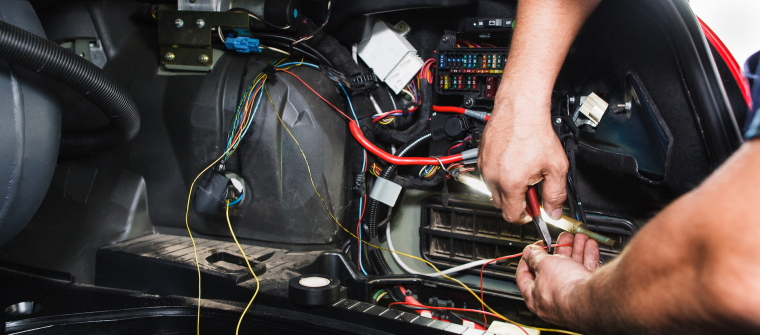Are Electric Cars Easier to Maintain?
Published on: Monday, 28 February 2022 | Author: Jack Dreyer
As more and more of Britain’s motorists make the switch to electric cars, we have to ask ourselves, ‘Is it worth it?’.
Although they might be all the rage at the moment, plenty of us aren’t actually that familiar with electric and hybrid vehicles — especially not in terms of how they compare to regular cars in terms of maintenance and performance.
So just how different are regular combustion engine cars from their electric counterparts. In terms of maintenance and upkeep, just how well do electric vehicles fare?
Read on to find out.
Electric car maintenance costs
First, let’s talk figures. On a regular combustion-engine vehicle there are numerous expenditures for maintenance that you’ll have to fork out for over the years. Engine oil changes, engine repairs, fluid top-ups, not to mention the repairs to the under-bonnet area.
In contrast, there are fewer maintenance-related outgoings on an electric vehicle because there are fewer parts. Oil changes and air filters are not required which brings maintenance costs down dramatically, as does the simplicity of the electric motor which rarely requires repairs.
Fuel
Without stating the obvious, the most crucial difference between electric and combustion engine vehicles is fuel. Not only is plugging in your car cheaper than buying litres of petrol but all of the problems associated with fuel and fuel consumption are removed.
Emissions charges such as the LEZ and ULEZ no longer apply to you, while risks like oil and petrol leaks are ruled out entirely. In that respect, electric vehicles are then much easier to maintain.
When you add the government grants for electric cars into the mix, it feels even easier to own one. The Plug-In Car Grant run by the UK government makes the owning and maintaining of electric vehicles much more cost-effective. For example, the price of EV batteries is rebated by £3,700 under this scheme.
What’s more, electric car owners can save up to £600 on top of this as electric cars have no first-year tax. This saved money can be used to cover maintenance costs in other areas.

Maintaining your electric vehicle
Though they have far fewer maintenance costs, electric vehicles still share many of the same features as regular vehicles. Smaller more standard features such as windscreen wipers must still be checked regularly, as with combustion engine cars, which can take time or professional assistance to check out.
Some of the key electric vehicle features that require regular maintenance include the following:
- Tyre sidewall health
- Tyre pressure
- Tyre tread depth
- Brakes
- The windscreen
- Wiper blades
- Fluids like antifreeze (or washer fluid)
- General wear and tear
- Headlights
- Brake lights
- Turn signals
Regardless of whether you have an electric or a regular car, there are also a whole host of internal features that require maintenance; for example, airbags and air conditioning coolant fluid.
Additionally, there is unfortunately no way around cleaning the car, electric or otherwise. So you can add rinsing, waxing, and polishing the tyres and bodywork onto the list of maintenance tasks too.
Electric vehicle maintenance checklist
In order to keep your electric vehicle running at its best for as long as possible, you should conduct regular checks on its vitals.
Each month, you should check and amend the tyre pressure as well as examine the tyre tread depth and sidewalls for wear, punctures, and cracking. You should also check and refill the windscreen wiper fluid.
It is also a great practice to swap your tyres over every 7,000 miles or so (along the axle), as well as checking the battery coolant levels, looking for possible fluid leaks, and conducting a visual inspection of the brakes, steering, suspension, and charging accessories.

How reliable are electric cars?
When it comes down to reliability, however, electric cars take gold. Put simply, electric vehicles just have fewer moving parts and therefore fewer intricacies to go wrong. The electric motor is far simpler and easier to fix. There is no oil to change; no gaskets to blow, and no valves to block up.
Everything associated with combustion engines is not an issue for electric car drivers, so you can tick those off the maintenance to-do list.
Electric car battery maintenance
One thing you will have to regularly maintain as an electric car driver is the battery.
Perhaps the most essential component of electric cars, the battery is the heart and soul of the vehicle and must be kept in tip-top condition or else the car physically cannot run.
Without a doubt the largest maintenance-related expenditure for electric vehicle owners too, the battery cannot last forever. When the battery loses its capacity and begins to lose charge quickly, you’ll need to replace your electric car’s battery. This can be costly and a bit of a troublesome process.
However, on the plus side, this isn’t a procedure that you’ll need to do that often. As it stands, electric car batteries are extremely resilient and durable — depending on where you purchase them from and how you look after them.
It is estimated that a standard lithium-ion battery can last for more than 100,000 miles. In fact, Tesla’s latest model reported a less than 7% decrease in battery performance after a whopping 250,000 miles! That being said, whatever car you drive, it is always a good idea to book in for regular check-ups, especially on key pieces of equipment like batteries.
So, what’s the verdict?
All things considered, then, it seems that electric cars are actually plenty easier to maintain.
While there are a wide variety of factors that influence how easy a car's maintenance is — tyres, accidents, model of car, driving habits — the maintenance costs and time taken are on average much lower for electric cars than they are for vehicles with a combustion engine.
However, we shouldn’t forget about the higher price of buying an electric car upfront. But that lends itself to a whole other blog entirely….




